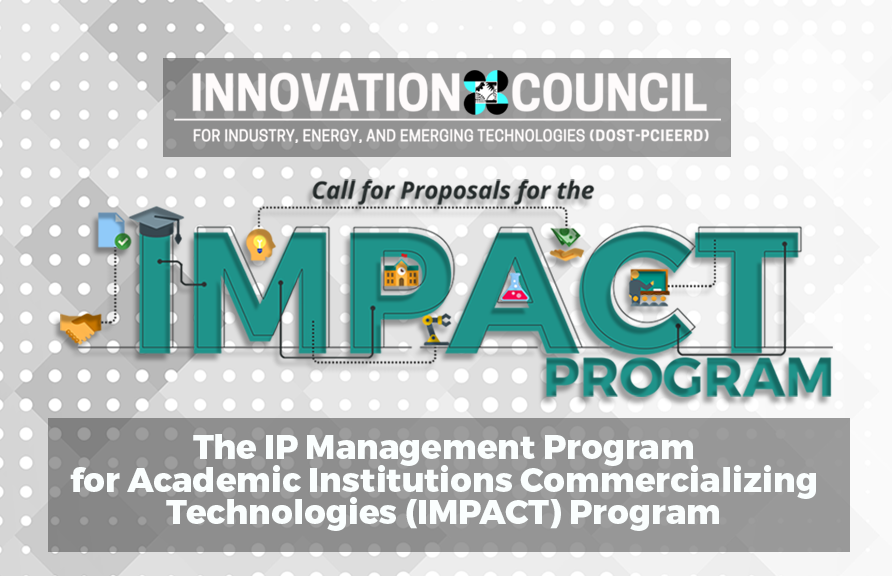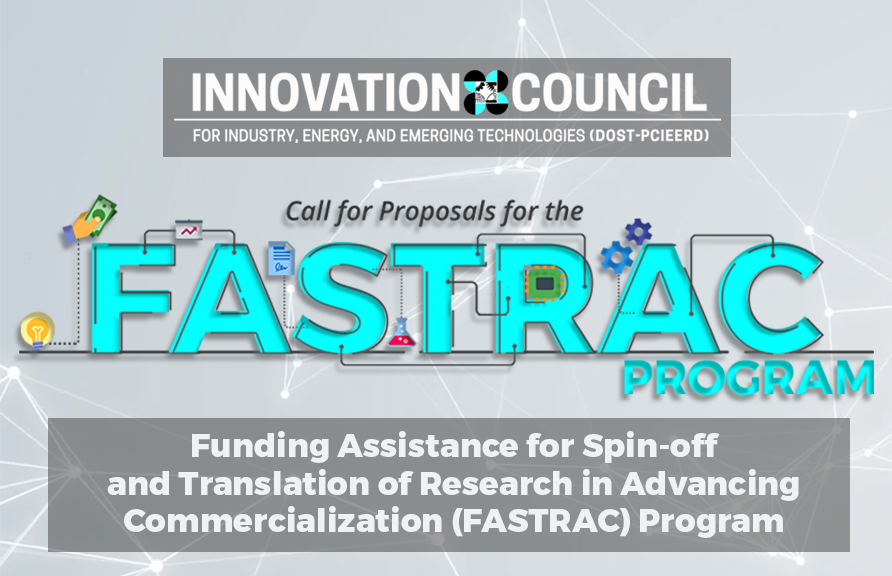| Downloadables for IMPACT Program |
| IMPACT PROGRAM GUIDELINES |
- Details
- Details
| Downloadables for FASTRAC Program |
| FASTRAC PROGRAM GUIDELINES |
- Details
The Philippines will mark another milestone with the launch of Maya-1, the first Filipino cube satellite, in space in July 2018. Implemented by the PHL-Microsat Program of the University of the Philippines Diliman, in collaboration with the Department of Science and Technology - Advanced Science and Technology Institute (DOST-ASTI) and the Kyushu Institute of Technology, Maya-1 was turned over to the Japan Aerospace Exploration Agency (JAXA) last May 15, to prepare for its launch.
The development of the Maya-1 falls under BIRDS-2 (Birds Satellite Project), a cross-border interdisciplinary satellite project that accommodates non-space faring countries. The project consists of 11 participating team members from four different countries – two of whom are from the Philippines.
The team behind Maya-1
The Philippine representatives of the BIRDS-2 Project (Left); and the Maya-1 (Right)
Kyushu Institute of Technology (Kyutech) students, Joven Javier and Adrian Salces, represented the Philippines throughout the project.
Master of Engineering student Javier is responsible for monitoring the development task progress of the project. Taking on the role as team leader for the whole BIRDS-2 batch, he is also in charge of supervising the project cycle, ensuring that all stages – from the preliminary design to the satellite operation – are running smoothly and accordingly.
PhD in Engineering student Salces, on the other hand, takes over managing the communication subsystem of the satellite. Moreover, he ensures the continuation of the establishment and operation of a ground station network, demonstration of the data collection system consisting of the CubeSat constellation, and the identification of all technical challenges of the system.
The Maya-1 in a nutshell
In line with the functionalities identified by the BIRDS Project, Maya-1 is set to take images of the earth using onboard cameras, broadcast signals from various satellites, and determine their locations, measure atmospheric density through orbital analysis, help operate a ground station network for CubeSat constellation - an application that will allow for easier telecommunication, and measure single-event-latch ups in orbit.
Just like how Diwata-1 and Diwata-2 paved the way for science to grow and flourish in the Philippines, Maya-1 will serve as a representation on how we strive to make our mark as a globally competitive country in the space tech scene.
The projects under the PHL-Microsat program are funded by the Department of Science and Technology and assisted by the Philippine Council for Industry, Energy and Emerging Technology Research and Development (DOST-PCIEERD).
- Details
The Philippine Council for Industry, Energy and Emerging Technology Research and Development (PCIEERD) and the University of the Philippines, through the National Engineering Center, launched the Higher Education Institution Readiness for Innovation and Technopreneurship (HeIRIT) Program, a 12-month preparatory program for starting technology business incubators (TBIs).
The HeIRIT Program was designed to help universities meet the requirements of the Council’s TBI funding and train their managers to run their own DOST-affiliated TBIs to cater the growing demand for early stage entrepreneurial support particularly in the regions. The kick-off activity held last April 16-18, 2018 at the UP National Engineering Center was participated by different university TBI representatives. 20 out of the 45 universities that applied around the country were successfully selected by the Council’s Panel of Experts to undergo the said program. Another two universities were added in the list of successful applicants through a move by then PCIEERD Executive Director, Carlos Primo David, in 2017 as part of the Director’s Save Award.
Dr. Rizalinda de Leon, Executive Director of the National Engineering Center said, “Universities, therefore, should ensure that its students and faculties will be successful in their innovation entrepreneurship endeavors. As enabling partners, we shall help our universities create and implement new ideas that generate value for public use. Your attendance on this program tells us that we are all one in heart and mind in recognizing that innovation and entrepreneurship are important to address major developmental challenges – inclusion, sustainability and prosperity.” as she welcomed the participants.
The overview of the DOST TBI program was presented by Ms. Russell Pili, program manager of PCIEERD TBI Program, highlighting the objectives, which are to create jobs, develop entrepreneurs, and promote public-private partnerships. Further, she emphasized that the universities has the largest resources of talent and ideas, and it is the role of the new TBI managers to harness their talent and provide a supporting environment for future young entrepreneurs.
“The goal of the DOST is to establish 1000 startups in the next five years through replication of startup communities in the regions.” said Ms. Pili. This challenged the participants to earnestly take part in the program and produce promising startups in the next five years.
“’Technology Business Income’ is what TBI really is and not only a mere technology business incubator.” Prof. Nestor Rañeses mentioned during his presentation of the HeIRIT Program. “HeIRIT is all about innovation - something different, something significantly better, and something that will create a difference,” he added. Professor Nestor Rañeses is the project leader of HEIRIT and is the helm of this trailblazing initiative. He encouraged the universities to change the academe’s status quo and produce not only graduates but entrepreneurs. After the one-year program, the universities must have their business model and list of target markets, build partnership in the business sectors, and secure a sustainability plan for their respective TBIs.
“Five best practices that has been determined to be success factors for TBI’s are: passion, clarity of purpose, T.E.A.M. (Together Everyone Achieves More), feedback, and investors.” Prof. Rañases shared as he summed up.
With the HeIRIT’s empowering program and tagline – “Ideate. Create. Innovate. Incubate. Invest.”, all participating universities were fueled up to take the challenge of bringing out their best efforts for the program.
HeIRIT Program grantees
2. Bicol University
3. Bulacan State University
4. Cagayan State University
5. Cebu Institute of Technology
6. Holy Angel University
7. Iloilo Science and Technology University
8. Mapua Institute of Technology
9. Miriam College
10. Nueva Vizcaya State University
11. Siliman University
12. St. Louis University – Baguio
13. Technological Institute of the Philippines – Manila
14. Technological University of the Philippines – Visayas
15. University of Mindanao
16. University of San Carlos
17. University of Santo Tomas
18. University of Southeastern Philippines
19. University of the Cordilleras
20. University of the Philippines Mindanao
21. Samar State University
22. Mariano Marcos State University
More information on the TBI Program at http://pcieerd.dost.gov.ph/work-with-us/59-technology-business-incubation-program.








